When you lawfully enter the property of another, it is reasonable to expect it will be free from hazards. But this isn’t always the case — and if you are hurt due to a dangerous condition on someone else’s property, you may be able to sue for your damages by asserting a premises liability claim. Critically, a property owner’s actual or constructive knowledge of the defect that led to your injury will be key to determine whether they can be held liable for negligence. Establishing that they knew, or should have known, about the condition will determine the success of your lawsuit.
What is Actual Knowledge?
In a premises liability claim, actual knowledge means the owner or other party responsible for maintaining the property was aware of the hazard that caused your injury. If the owner knew about the dangerous condition because they saw it, or received a notice or complaint about it, they would have had actual knowledge. Specifically, actual knowledge can be proven by showing either direct or circumstantial evidence. Testimony, maintenance reports, or correspondence can all be used in court to demonstrate the owner knew about the defect.
Actual knowledge shows that the responsible party was consciously aware of the condition. If an owner has actual knowledge that there is a hazard on their property which could cause a foreseeable injury, they have a duty to make timely repairs or issue a warning. For example, if a property owner knew that a wooden staircase was rotting and did not warn visitors it could collapse, they could be held liable for any injuries incurred because they knew of the potential danger.
What is Constructive Knowledge?
Constructive knowledge means a party is presumed to have knowledge of a dangerous condition because they “should have known” about it. In other words, it can be defined as the level of knowledge a property owner would have as a result of due diligence when it comes to their property. A person can have constructive knowledge of a hazard, even if they lacked actual knowledge.
Importantly, an owner has a responsibility to conduct reasonable inspections of their property. If they fail to do so — and such inspection would have revealed the hazard that caused a visitor’s injury — constructive knowledge may be established. A good example of constructive knowledge is a visible spill in the supermarket. If a spill was not mopped after a reasonable amount of time, the supermarket may be held liable for an injury on the grounds that it was there long enough for an employee, manager, or the owner to have discovered it.
Proving an Owner’s Constructive Knowledge
While it can often be easier to establish a property owner’s actual knowledge of a dangerous condition on their premises, proving constructive knowledge can sometimes be more complex. One of the major factors in establishing constructive knowledge is showing the length of time the defect or hazard was present before the accident occurred. Depending on the facts and circumstances of the case, evidence that can be used to show an owner’s constructive knowledge can include the following:
- Video surveillance showing that a manager or employee walked past the hazard several times
- Photos showing footprints on the condition that caused a fall
- Reports of similar accidents in the same location
- Reports from witnesses who reported the hazard
- Maintenance and inspection logs
A good personal injury attorney can evaluate your claim and assess the best strategy to pursue. They can also help to gather the necessary evidence and documentation that will support your claim — and hold the negligent party accountable for your injuries.
Contact an Experienced New York City Personal Injury Attorney
In the event you were injured on the premises of another, it’s vital to have an experienced personal injury attorney by your side. As a result of our commitment, knowledge, and experience, The Edelsteins, Faegenburg & Blyakher LLP regularly secures substantial verdicts and significant settlements for clients in their premises liability cases.
The Edelsteins, Faegenburg & Blyakher LLP is a personal injury law firm dedicated to fighting for the rights of accident victims to ensure they get the monetary recovery they deserve for their injuries. Located in Manhattan, our firm has been handling personal injury cases throughout New York City since 1937. Call to schedule a free consultation at (212) 425-1999 today.

